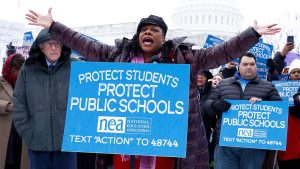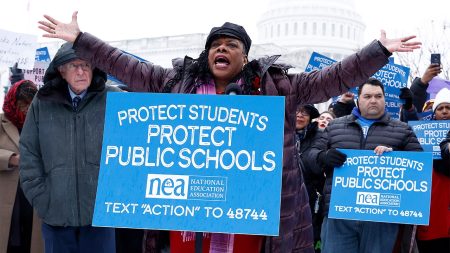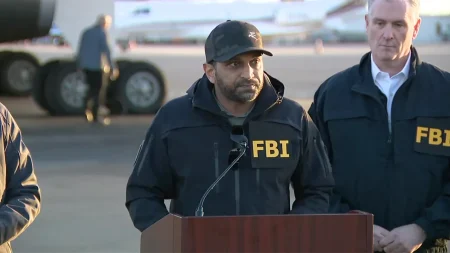ABC News Suspends Top Executives Following Controversy Over Trump Documentary Editing
Media Giant Takes Swift Action Amid Allegations of Journalistic Misconduct
In an unprecedented shake-up that has sent shockwaves through the media landscape, ABC News has placed several high-ranking executives on administrative leave following allegations that footage of former President Donald Trump’s January 6 speech was manipulated in a documentary. The swift disciplinary action comes amid growing criticism from both media watchdogs and political figures who claim the editing misrepresented Trump’s statements before the Capitol riot, raising serious questions about journalistic integrity at one of America’s most prominent news organizations.
The controversy erupted when media analysts and Trump supporters identified discrepancies between the former president’s complete remarks delivered at the “Stop the Steal” rally and segments featured in the documentary. Critics allege that crucial context was deliberately removed through selective editing, creating a misleading narrative about Trump’s role in inciting the subsequent violence at the Capitol. The editing in question reportedly omitted portions of Trump’s speech where he urged supporters to “peacefully and patriotically make your voices heard,” while emphasizing more inflammatory rhetoric. This revelation prompted immediate backlash from media ethics experts who stress that accurate representation of source material represents the bedrock of journalistic credibility, particularly when covering politically sensitive events that continue to divide the American public.
ABC News executives initially defended the documentary’s production, arguing that time constraints and narrative focus necessitated editorial choices that they maintained were fair and representative. However, as pressure mounted from both external critics and internal staff concerned about damage to the network’s reputation, the organization launched a comprehensive internal review of the editorial process that led to the controversial final cut. “Maintaining public trust is paramount in journalism,” said a senior media analyst who requested anonymity to speak candidly about the situation. “When editing decisions create even the perception of partisan manipulation, it undermines the essential role of media as an honest broker of information in a democracy already struggling with deep divisions and information skepticism.”
Editorial Decisions Under Scrutiny as Network Faces Credibility Crisis
The disciplinary action affects multiple executives who oversaw the documentary’s production and approval process, though ABC News has declined to name specific individuals pending the completion of their investigation. Sources familiar with the matter indicate that both senior editorial decision-makers and production staff have been included in the administrative leave directive. The network has appointed an independent review committee comprising veteran journalists and media ethics experts to evaluate not only the specific editing choices but also the broader editorial oversight mechanisms that failed to prevent what many now view as a serious journalistic lapse. This development represents a critical moment for mainstream media organizations navigating an increasingly polarized political landscape where accusations of bias from across the political spectrum have eroded public confidence in news reporting.
Industry observers note that the controversy highlights the particular challenges facing documentary filmmakers and news producers who must condense complex events into coherent narratives without sacrificing accuracy or context. “The tension between storytelling and journalistic responsibility becomes especially pronounced when covering politically charged topics,” explained Dr. Eleanor Hartman, professor of media ethics at Columbia Journalism School. “Documentary producers must make countless editing decisions, but when those choices substantively alter how viewers perceive historical events of national significance, they cross a critical ethical line.” The incident has prompted calls from media accountability organizations for greater transparency in documentary production, including clearer disclosure of editing practices and potential consideration of making raw footage available for public review in cases involving contentious political coverage.
The fallout extends beyond ABC News, triggering renewed debate about media coverage of Trump and the January 6 Capitol riot, which remains one of the most politically divisive events in recent American history. Conservative commentators have seized on the controversy as evidence of systemic media bias against the former president, while press freedom advocates express concern that legitimate criticism of editorial missteps might be weaponized to undermine public trust in journalism broadly. Congressional Republicans have announced plans to launch an investigation into what they describe as “systematic media manipulation” of Trump’s statements, with several demanding that ABC News executives testify before committees examining media practices. Democratic lawmakers have largely remained silent on the specific controversy while continuing to emphasize the gravity of the January 6 events and Trump’s broader responsibility for promoting election fraud claims that mobilized the protesters.
Broader Implications for Media Trust and Political Polarization
This incident occurs against the backdrop of historically low public confidence in media institutions, with recent polling indicating that fewer than half of Americans trust traditional news sources to report information fairly and accurately. Media analysts suggest that high-profile controversies like the ABC News editing scandal further entrench partisan perceptions about news coverage, complicating efforts to rebuild trust across ideological divides. “The real tragedy here is that when mainstream outlets make these kinds of mistakes, it validates the narrative that all unfavorable coverage is ‘fake news,'” noted media historian Dr. Jonathan Reeves. “This makes it increasingly difficult for journalists doing rigorous, fair-minded reporting to reach audiences who have grown deeply skeptical of their motives and methods.”
ABC News has promised “complete transparency” regarding the findings of their internal investigation and pledged to implement whatever reforms are recommended by the independent review committee. The network has also committed to issuing corrections or clarifications as warranted once the review is complete. However, critics argue that the damage to public perception may prove difficult to repair, particularly among conservative audiences who have long harbored suspicions about mainstream media coverage of Trump. “The fundamental challenge for ABC and similar organizations going forward isn’t just about correcting this specific instance, but rebuilding systems that prevent such lapses and convincing increasingly skeptical audiences that they can be trusted to present information fairly,” said former network news executive Marianne Wilson, who now consults on media ethics issues.
Media ethics experts emphasize that this controversy transcends partisan politics, touching on fundamental principles of journalistic practice that should concern citizens across the political spectrum. The selective editing of newsworthy content, whether intentional or negligent, undermines the public’s ability to make informed judgments about critical events and the actions of public figures. As traditional media outlets continue to face competition from alternative information sources with varying commitments to factual accuracy, incidents that compromise public trust potentially accelerate the fragmentation of shared information environments that democracies depend upon. The ABC News controversy thus represents not merely an isolated editorial misstep but a symptom of broader challenges facing journalism in an era of intense polarization, diminished public trust, and competing information ecosystems that often prioritize narrative confirmation over factual accuracy.
The network’s leadership now faces the daunting task of implementing meaningful reforms that address both the specific editorial failures and the organizational culture that allowed them to occur. As one senior ABC journalist speaking on condition of anonymity observed, “This isn’t just about restoring our credibility with the public. It’s about recommitting ourselves to the fundamental principles that make journalism worth defending in the first place.” Whatever the outcome of the network’s internal investigation, this controversy serves as a stark reminder of journalism’s essential responsibility: to present events accurately and in context, particularly when covering the most consequential and divisive moments in national life.










